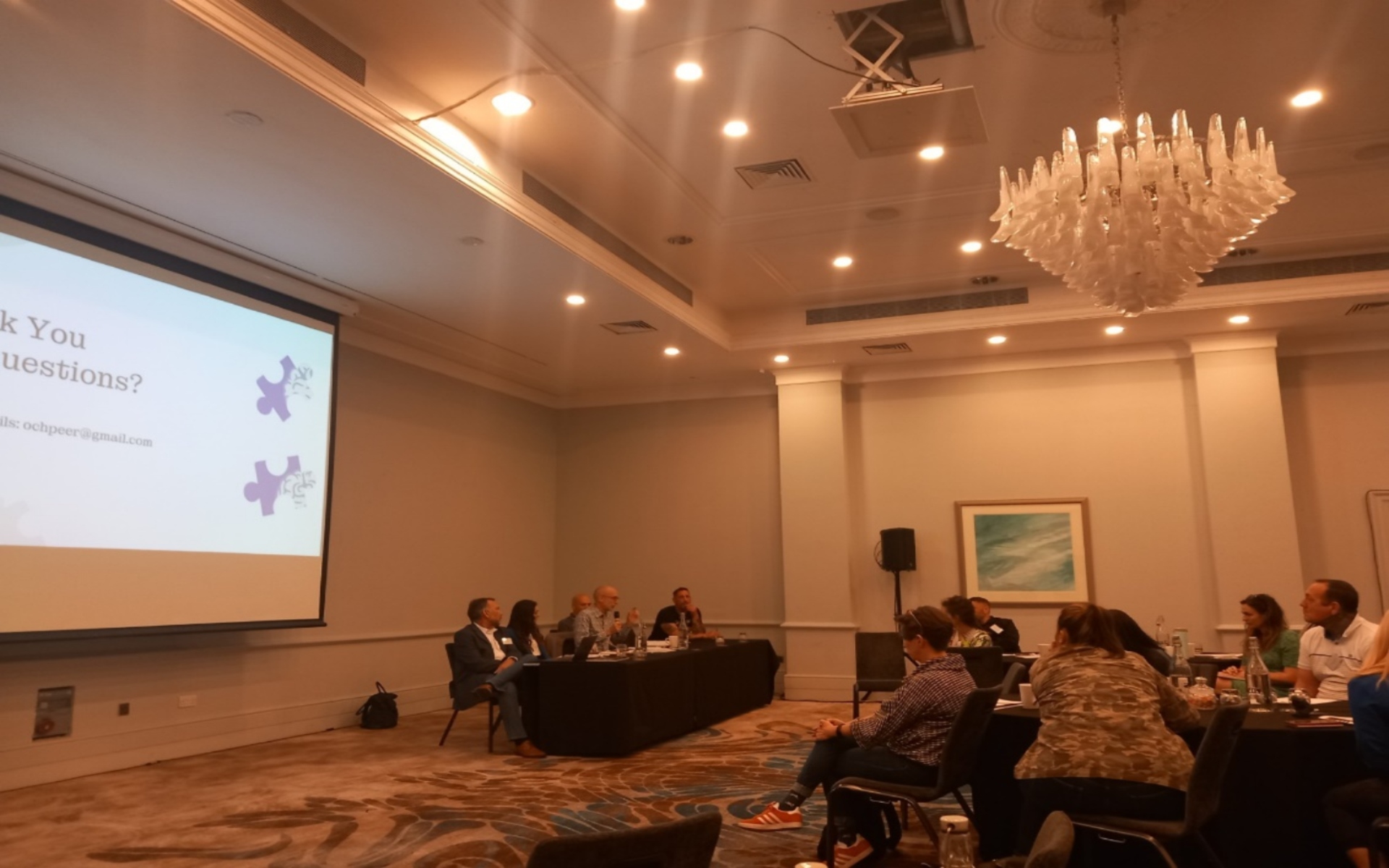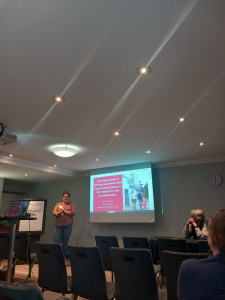
Homelessness, psychology and policy
22 July 2024
“Humans and non-humans have the inherent capacity for wholeness, regeneration, healing and transformation.” (Avril Bellinger, Principles of the strengths approach)
Firstly, what a name for an event!!!
Straight away I was interested in the Centre for Homelessness Research and Practice’s annual conference on ‘Homelessness, Psychology and Policy’, and really looked forward to seeing how this was going to work together as a whole unit.
The purpose of the conference was to bring together a community of people who are interested in developing the workforce of those in the homelessness sector through psychological approaches, and to enable the sharing of best practice for integrated learning.
I have a specific interest in relationships and the power dynamic of a ‘them and us’ mentality. I was very excited to see psychology written in the same paragraph as homelessness and policy.
The organiser of the event, Jennifer Tarabay, a psychologist and manager of the regional Homelessness Community of Practice, introduced the conference and emphasised the importance of communication, specifically between those working to end homelessness. This was reflected through the well-considered activities of the day, which reflected the importance of sharing, problem solving and learning from each other.
One of the main discussion points was about policy and how we implement and influence policy at a ground level.
Psychology was introduced as a talking point for the basis of understanding behaviour, specifically, to understand how relationships are formed and how people interact with each other.
Rick Henderson, Chief Executive of Homeless Link, highlighted a good point, he raised the question about how those that create policy and have the power to implement change – how might they go about their day?
Do they practice mindfulness and self-reflection?
How do they view themselves and how do they view other people in relation to themselves and the environment they work in?
A psychologist can be useful within the services to help people understand their own behaviour and to understand other people’s reactions and responses to the current environment/ issue/ problem/ situation.
We also heard from Professor Nick Maguire who delivers training courses to staff, volunteers and outreach workers working on the frontline supporting people who are experiencing homeless.
His work at the University of Southampton as a Professorial Fellow in Clinical Psychology enables Nick to make use of his training in evidence-based psychological approaches to provide training, research, and evaluation.
There was some discussion around having simple solutions for complex problems and how one implements the policy often can be the source of why it fails.
Rather than looking for new solutions to fix the current policy, we should look more into the different layers of the situation and work to see another way of ‘looking’ which involves how you view yourself and how you view the next person. How relationships are formed within the sector. How you feel about yourself, your views and opinions and prejudices affect the relationship you have with yourself and the relationship with the next person.
Professor Nick Maguire said that a new framework is needed, which represents the complexity but simplifies enough to be able to generate policies that drive interventions which are concrete enough to be useful.
Another speaker was Alex Bax, Chief Executive of Pathway, which is a national homeless inclusion health charity. Pathway supports the inclusion health community with the intention to improve the experience and health outcomes of people who are homeless in hospital.
He spoke about the Pathway Partnership Programme which introduces a multi-disciplinary team of committed professionals that can work with people experiencing homelessness in hospital to support their longer-term needs and stop them needing to come back to hospital.
This involves a specific team that has a fresh view and different way of working. The training model has been developed working alongside people with lived experience of homelessness that enable learnings from a different perspective.
Alex Bax said that as a service you should go to where the people are and do something to help that person and build trust.
He also said that you should reflect on a situation and learn from it. Having conversations is a powerful way to consolidate strong learning, and then for this learning to be shared.
There is now nine ongoing Pathway teams across the UK. The programme presents a summary of data which highlights the successes of each team, as well as the challenges facing homeless patients and the Pathway team.
In ny opinion, this way of thinking is favouring change and improvement as opposed to remaining the same. It allows for the system to work from ground up rather than from top down.
Pathway is currently having conversations with senior people from the NHS to talk about commissioning better services for homeless and inclusion health groups, as well as convening with colleagues with lived experience of homelessness to think about some of the issues.
At the moment, one of Pathway’s main focus areas is to speak to the NHS to highlight the need to implement a policy which ensures no one can be discharged from the hospital onto the street. There is a need to invest in some services in order to get there, but it is an achievable goal.
Feel free to look into the programme for yourself, it is all on the website for you to investigate: www.pathway.org.uk
The event transitioned into smaller groups, which felt necessary after a day of speakers. This allowed each group to focus on a specific topic, ranging from climate change and community solutions to peer research.
In the ‘community solutions’ session, we had the opportunity to hear from several organisations, exploring their work and initiatives.
A highlight for me was Sara Emerson from JustLife, a Brighton-based organisation, her talk about the project she has established was particularly impactful and got the room thinking!
She shares her skills and knowledge from working in the sector with voluntary organisations such as foodbanks, faith groups and day centres, who are often working with those experiencing homelessness and may not have access to extensive training.
Sara’s approach instils confidence in those volunteering to be able to have trauma-informed conversations, understand safeguarding and be equipped with some knowledge about the housing system, recognising how building trusting relationships is essential at every point of accessing services.
She also encouraged us to reflect on our own skills and resources, how we could utilise them and who might benefit from them.
Should there also be onus on ‘community’ for ‘solutions’ to tackle homelessness?
In another the break-out room, I met Avril Bellinger who is a social worker and academic activist who founded Students and Refugees Together (START) twenty-three years ago in Plymouth.
START organises a range of activities to support refugees in transition. To make connections, to create hope and to be part of/or to find a community. As the host community saw the students and refugees as being a burden.
Avril made it her duty to help, and since then students and staff at START have worked with refugees to avoid homelessness and destitution. Good on you!
Avril is an advocate for the strengths approach and has written a book titled The Strengths Approach in Practice, How it Changes Lives.
The strengths approach has the intention of supporting people to realise their potential. Rather than looking at the problem, you look at the solutions available and work with the strengths of that person.
I would like to highlight some of the words spoken that really hit the spot for me, where I felt, ‘Yes! If only we all did this!’
Avril said that we should relinquish ideas that we are ‘helpers’ and ‘givers’, in some way superior to ‘needy’ others. Instead, we should seek the possibility of human connection that builds strength through relationship, however brief.
The day concluded with a networking event where attendees were encouraged to take a coloured thread corresponding to their area of work within the sector, for example ‘health’ or ‘housing’.
They were then encouraged to swap threads by engaging in conversations with other attendees from different parts of the sector. The final event reflected the days’ theme of community, collaboration and togetherness. Whilst the room was chatting, we spoke to a few people who attended to gather their feelings and gave us their main ‘take aways’ from the day:
“How do we implement policy? As a resettlement worker, I think policy makers should listen to front line workers and those that they support. I am going away with more questions than answers.”
“Hopeful, enthusiastic and feeling positive.”
“The need to listen to those with lived experience of homelessness.”


